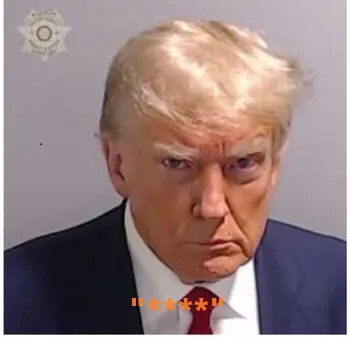
A little more than four years ago, Peter Baker wrote in the New York Times about “The Profanity President” and his “four-letter vocabulary.”
He was referring to then-president Trump’s already infamous vulgarity, “full of four-letter denunciations of his enemies and earthy dismissals of allegations lodged against him.” “At rallies and in interviews, on Twitter and in formal speeches, he relishes the bad-boy language of a shock jock, just one more way of gleefully provoking the political establishment bothered by his norm-shattering ways,” Baker added.
In the same piece, Baker notes how Trump “feigned shock in January [2019] when the newly elected Representative Rashida Tlaib of Michigan said she and her fellow House Democrats were “going to impeach the ————”
This writer has omitted the vulgar word. However, if the reader wishes, he or she can find it listed in Indy100 as the 2nd “most offensive American swear word.”
In a January 4, 2019 article, the New York Times writes that Tlaib used the profanity “at a celebration at a bar near the Capitol.”
What Tlaib said was wrong. She was criticized by Republicans and Democrats. A few days later, she “semi-apologized” but only because “it was a distraction.”
Trump at the time told reporters that he thought Tlaib “dishonored herself…Using language like that in front of her son…it was highly disrespectful to the United States of America.”
Fast forward to four years later.
On Friday, Trump used the same profanity in a speech laced with other vulgarities and vicious personal attacks while addressing the California Republican Party in Anaheim, just a few blocks from Disneyland.
During the speech, Trump said:
What they’ve done is they’ve gone after opponents, so that if you become president, or some other job, but if you become president and you don’t like somebody, or if somebody’s beating you by ten, fifteen, or twenty points like we’re doing with Crooked Joe Biden, let’s indict the ————! Let’s indict him.
The audience (I don’t know if children were present, but there certainly were many God-fearing, “family values” ladies enjoying their $600-a-plate luncheon) responded with cheers and applause – as it did to all the other “fine points” Trump raised during his speech.
It was not the first time Trump publicly used the 2nd most offensive American swear word.
In the spring of 2011, ranting about China’s exports flooding America, Trump told a Las Vegas audience, “And I could say: ‘Listen, you ————-, we’re gonna tax you 25 percent.’” And the audience reacted with “big applause, laughter and giddy sounds of excitement.”
Trump is no stranger to (publicly) using the “most offensive American swear word.” The one described in Indy100 as “The worst of the worst, a word that cuts through the air like a blade: The C-word.”
Examples of his use of that word are cited here and here.
The reader may ask, “We all use profanity once in a while. What is the big deal?”
The “big deal” is that the man who should set an example in civility, in acceptable behavior, bears a lot of responsibility for the coarsening of civility, for hackneying the American discourse, for normalizing crudeness, profanity, obscenity, and vulgarity.
Representative Adam B. Schiff, Democrat of California, in May of 2019, could not have said it more clearly:
No one has debased the civil discourse in this country more than President Trump, and the president really does set the tone in the country. We see it reflected in our offices by the hateful, belligerent, obscene and violent calls that we get now that we didn’t used to get.
Bombarded by a constant barrage of profanity from a sitting president – and now from a candidate for the nation’s highest office – we see it also reflected in how the media reports Trump’s outrages.
Not many years ago, reputable media would use “grawlix,” hyphenation, “expletive deleted,” (“bleeping” in broadcasting) or some other circumspect method to replace or “masque” profanity used by Trump.
In January 2018, when Trump referred to African countries as “shithole countries,” the prestigious Associated Press (AP)went through intensive soul searching to explain to the world why “[the AP] quoted the president’s vulgarity.”
In 2019, the New York Times wrote, “Never has any president pushed the boundaries of language as far as Mr. Trump.” Today, even the venerable Gray Lady seems to have thrown in the towel trying to clean up Trump’s language.
Most media outlets now report Trump’s obscenities exactly the way he said or wrote them.
Today, Trump’s profanity has turned into a banality unbecoming the “greatest nation on earth.”
CODA:
Those who have ventured to the list of the nine most offensive American words will immediately realize that the former president has used most, if not all, of those profanities. A dubious accomplishment!
















